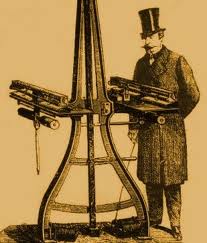While my mother-in-law was in hospice care, we watched closely for signs of pain. If we saw grimaces or if she cried out, the nurses could give her more morphine.
Sometimes, though, the prescribed amounts weren’t doing the job. The hospice team would quickly confer, in person or by phone, and recommend an increase in the regular and/or PRN dose and/or frequency. The nurse would then send the recommendation by to the doctor who, in turn, would send the prescription by fax to the pharmacy.
If the fax machine is out of paper or otherwise not working properly, the request or orders can be delayed. An hour’s delay for a normal prescription is no big deal. An hour’s delay for a terminal patient who is in pain is, well, do you want that for your mother?
The first patent for the process that would become a fax machine was issued in 1843. Based on those ideas, a commercial fax line connected Paris and Lyon in 1865.
 |
| The Pantelegraph in 1865, by Giovanni Caselli |
The Pony Express had come and gone.We were still a couple of decades away from the telephone.
Physicist Michio Kaku observes that paperwork is, to descendants of hunters and gatherers, proof of the kill. Our caveman selves, instantiated as CYA bureaucrats in insurance companies and government offices, demand hard copy to prove that we’ve done something useful.




